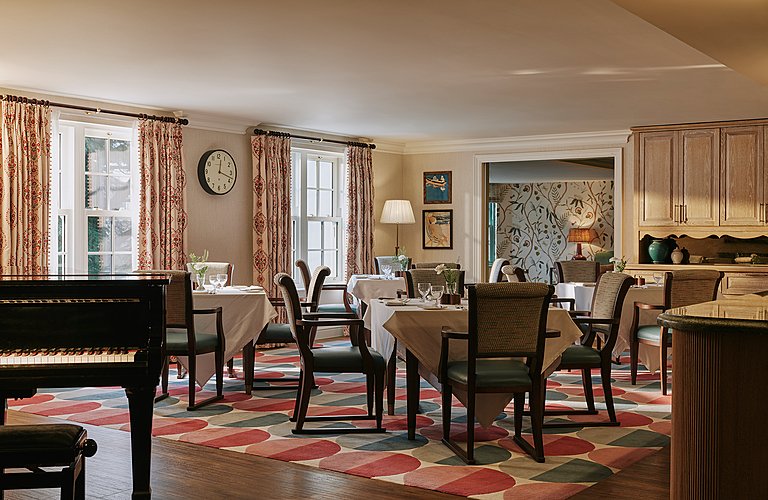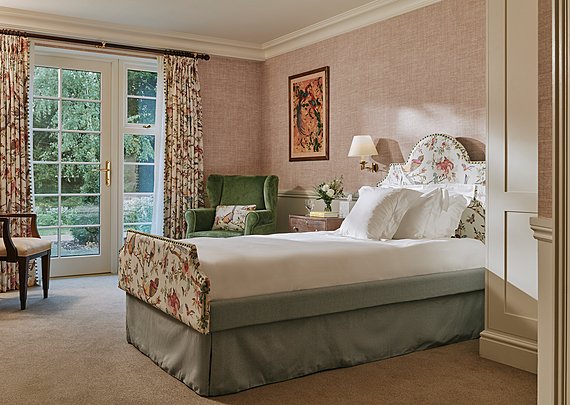192 Sloane Street, London SW1X 9QX

What Are Care Home Top-Up Fees?
In the UK, anyone moving into a care home can apply to their local authority for help to cover their care home fees. But what if their preferred accommodation costs more than what the council is willing to pay?
If your loved one has chosen a care home that exceeds the local authority's budget, someone else (e.g. a relative) may be able to cover the difference. This is called a third-party top-up payment, or care home top-up fees. This arrangement provides more freedom to choose the best care home for their needs, lifestyle and preferences.
In this guide, we will explore how care home top-up fees work, when they might be used, and who can make the payments. We will also discuss whether residents can pay their own top-up fees.
What Are Top-Up Fees in Care Homes?
When a person is unable to self-fund their care home fees, they may be eligible for help from their local authority. The council will conduct a needs assessment and a means test to determine how much funding they should receive. This is called their 'personal budget'.
The council will always recommend a care home that is both within budget and registered to accommodate the person's assessed care needs. But sometimes, the individual may wish to choose a care home that exceeds their personal budget.
In this case, a third party – such as a family member – can choose to pay the difference between the council's budget and the total cost of care. These payments are called care home top-up fees, or third-party top-ups.
When Might a 3rd Party Top Up Care Home Fees?
There are many circumstances in which top-up payments may be used. For example, if the resident:
- Would like to move to a different care home in a more expensive area closer to their family
- Was previously self-funding, but can no longer do so, and does not wish to move – but the care home's fees exceed the council's budget
- Would like to receive a higher level of care, with more choice, comfort, and increased levels of well-trained staff
- Wishes to live somewhere that offers higher quality meals or superior facilities (e.g. an in-house spa)
- Wants to move to a care home with a life enrichment programme that better suits their lifestyle and interests
- Would prefer a larger bedroom, but their needs assessment did not deem this a necessity
According to top-up fees legislation, care home top-up fees should only be paid if a resident or their family requests an optional upgrade. Care homes must never demand top-up payments for essential care. If they raise their fees, the council must cover this cost, or find alternative accommodation.
How Much Are Care Home Top-Up Fees?
All private care homes set their own fees, so there is no limit to how much top-up payments may cost. It all depends upon the gap between your care budget and your chosen care home’s monthly rate.
Your local authority will calculate your personal budget according to a financial assessment. If you have:
- More than £23,250 in savings and assets, you must self-fund your care home fees
- Less than £14,250 in savings and assets, the council will cover the full cost of your care
- Between £14,250 and £23,250, the council will pay for some (but not all) of your care
The above figures are correct as of October 2022. From October 2023, the lower capital limit will increase to £20,000 and the upper capital limit will increase to £100,000.
If the council is funding your care, you are free to choose from a list of care homes with no top-up fees. However, if you select a more expensive residence, a third party will have to pay the difference – whatever this may be.
Who Pays Top-Up Fees for Care Homes?
Residential and nursing home top-up fees are normally paid by close relatives, such as children or siblings. Sometimes, a charity may agree to contribute – you can check eligibility on the Turn2Us website.
Whoever decides to make top-up payments for care homes must arrange this with the local authority. They will need to sign a legal contract outlining the amount that is due and when. It should also state what will happen if the care home fees increase.
The decision to pay top-up fees (residential care homes or nursing) is voluntary: relatives are never responsible for funding someone’s care. If they can no longer pay, the council is not required to cover the top-up fee. This means that the resident may be required to move to a less expensive care home.
Can I Pay My Own Care Home Top-Up Fees?
Normally, it is not possible for older adults to pay their own care home top-up fees (UK). If you have the means to do this, you will not usually be eligible for council funding. This is why they are called ‘3rd party top-up fees’.
However, care home residents may be able to self-fund their top up payments in certain circumstances. For example:
- During the 12-week ‘property disregard’ period, when the value of the individual’s home does not count towards their capital
- If they have entered into a deferred payment agreement (DPA) with the council
You can read more about getting help with care home costs here.
Request a KYN Brochure Today
If you are looking for luxury care homes in London and the South East, discover KYN today. We strive to provide unparalleled standards of residential and nursing care in beautiful, uplifting environments.
We get to know each of our residents as individuals, tailoring their care according to their lifestyle, needs and choices. Through delicious Michelin-inspired meals and a wide programme of social and cultural activities, we aim to enrich the lives of everyone who calls KYN home.
Enquire with KYN today to request a call, visit or brochure. Fill in our contact form, call +44 (0) 20 3535 1923 or email enquiries@kyn.co.uk.

